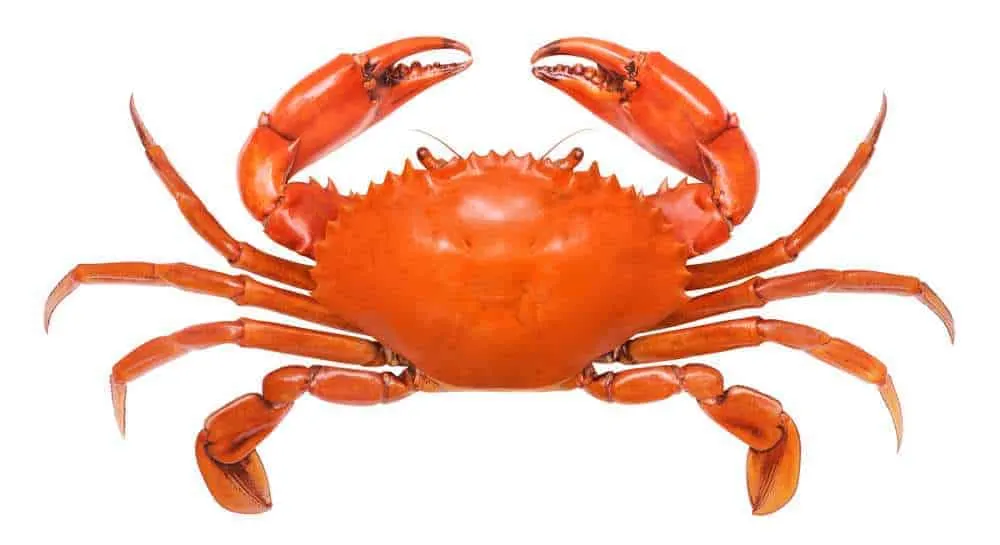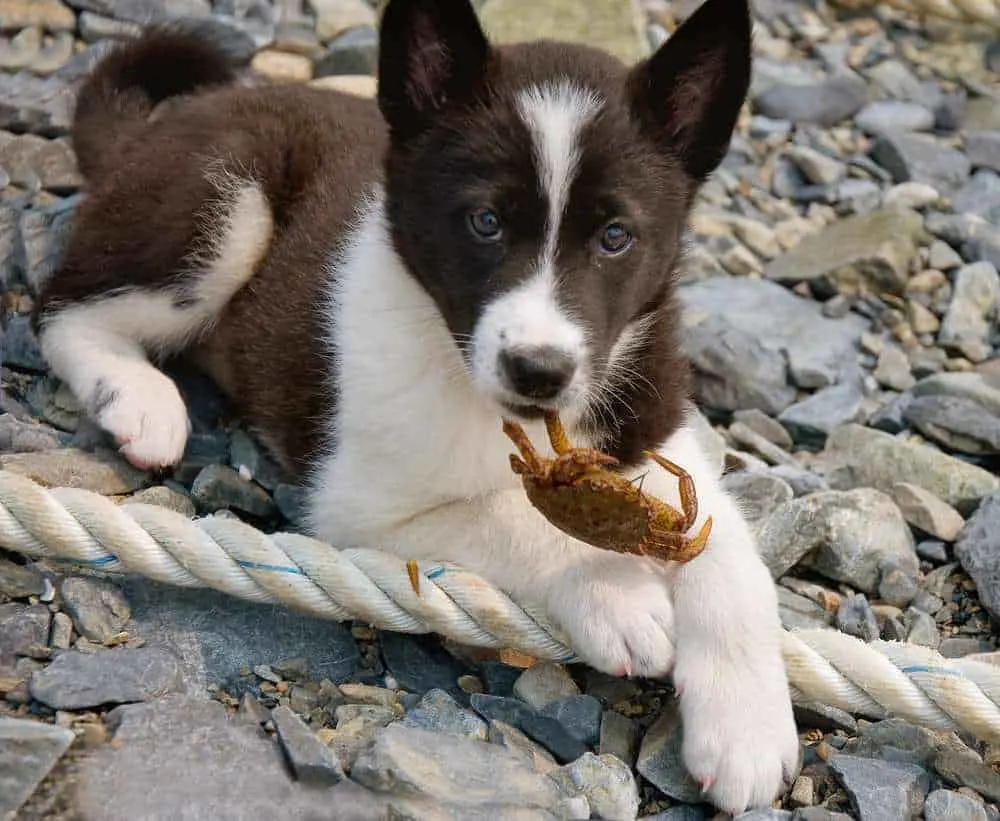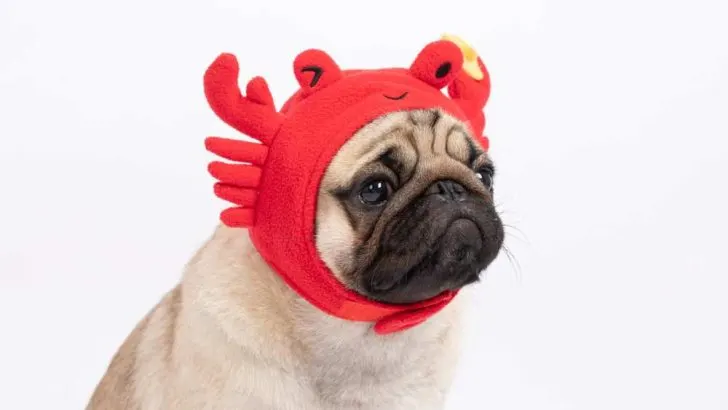It’s lunchtime, and you’re working from home since we’re in the middle of the global pandemic. Since you don’t have time to cook today, you’ve decided to order some food from a new Chinese restaurant.
After several minutes of looking through their menu, you’ve noticed they have crab meat, which you’ve never eaten before (frozen crab sticks don’t count!). So, the food has arrived, and the second you ripped the paper package, your dog comes begging for some.
Your four-legged friend is always doing that – whining and giving you that puppy eye looks that you just can’t resist! Well, crab meat indeed smells delicious to your dog, but is it safe to give him some? Can Dogs Eat Crab? What are the possible health risks and benefits?
We’ve investigated this topic thoroughly to give you all the information you need. Therefore, before you share crab meat with Milo, read this article first!

Can You Feed Seafood To Your Dog?
Yes, dogs can eat marine food, but it depends on preparation and species. First of all, the term ‘seafood’ includes not only fish, but shellfish, cephalopods, oysters, muscles, and other mollusks. Fish is the best option for canines, and they can certainly eat some crustaceans species like shellfish and shrimps, but they are typically less safe for several different reasons.
Some of the things you should watch out for before feeding your dog seafood are:
1. Mercury Levels
Mercury is present in our lakes, oceans, and rivers and enters through industrial waste. It accumulates in fish and aqua life. Hence, the bigger the fish and the longer its lifespan, the higher the mercury levels in its tissues will be.
Tuna, mackerel, and sea bass are larger fishes and live much longer, so they’re in this category. Of course, they’re not totally out of the question for your pup; you just have to feed them in moderation.
Furthermore, feeding your dog daily and in high quantities, fish with high mercury levels could lead to mercury poisoning.
Some of the symptoms are:
- Tremors;
- Vomiting blood;
- Bloody or watery diarrhea;
- Loss of coordination;
- Loss of feeling in paws;
- Kidney damage
- Inability to urinate;
- Hair loss;
- Anxiety or nervousness;
- Blindness.
Mercury poisoning could be lethal for your pup, so contact your vet promptly if you notice any of the symptoms stated above.
2. Fishbones
The second thing why fish could be hazardous to your canine is fish bones. Generally, bones, tail, head, and fins should not be served to dogs. You should always debone the fish first before giving it to your puppy.
Fishbones can injure the digestive tract and internal organs and cause your dog to choke. If you notice your dog drooling excessively, the bone is probably stuck in their throat.
3. Sodium Levels
You should always be careful when selecting seafood for your pup. Marine food is naturally high in sodium levels, and too much sodium can be very dangerous to your dog. Overeating salty food can make your dog thirsty, and that could cause him to drink excessive amounts of water, leading to a condition called bloat or sodium poisoning. It can also lead to high blood pressure, heart problems, and others. Keep in mind that dogs should eat 0,25 – 1,5 gr of salt per 100 grams of food daily.
4. Cholesterol Levels
High cholesterol levels in some seafood like crab, for example, can be difficult for dogs to digest. Too much cholesterol levels in canines are called hyperlipidemia and can lead to many health problems, such as pancreatitis.
In the end, some seafood is safe for your dog to eat, but don’t forget that moderation is vital. Seafood shouldn’t make up most of their diet, but should instead be given occasionally.

Can Dogs Eat Cab?
The short answer to this question would undoubtedly be – yes, dogs can eat crab. Crabmeat is not toxic for dogs and can even be very beneficial for their overall health.
Of course, you should give crab meat in moderation (more as a treat) and not every day.
In addition, your dog may be allergic to crab meat, or it could cause him stomach problems such as diarrhea or vomiting. So we advise you always to introduce new food slowly and see how your dog reacts.
Can Dogs Eat Crab Shell?
This is a definite no. Dogs can’t eat crab shells because they can be hazardous and cause many health problems. That’s because the shell may break off into shards upon chewing and pose a choking hazard. Moreover, it can even cause internal injuries and digestive problems. Thus, make sure you always remove the shell from the meat before you even start preparing it for your dog.
Can Dogs Eat Crab Sticks Or Raw Crab?
Crabmeat Sticks (or so-called ‘crab meat imitation’) are not good for your dog. The reason for this is that it is not the actual crab meat, but cheap processed fish meat that contains many additives and food colorings, which can be harmful to your pup.
On the other hand, you should never give your dog raw crab meat as it contains intestinal parasites, which can be very bad for your dog’s gut. Raw crab meat bacteria could leave your dog sick with severe foodborne illness. Also, the shell could pose a choking hazard, as we’ve already mentioned earlier.
Nutritional Value Of Crab Meat
Crab Meat Amount Per 100 grams
| Calories | 97 |
| Total Fat | 1,5 gr |
| Cholesterol | 53 mg |
| Sodium | 1,072 mg |
| Potassium | 262 mg |
| Protein | 19 gr |
| Vitamin C | 12% |
| Calcium | 5% |
| Iron | 4% |
| Vitamin B-6 | 10% |
| Cobalamin | 191% |
| Magnesium | 15% |

Benefits Of Crab Meat For Dogs
Crabmeat is rich in protein and has many vitamins and minerals. Furthermore, it is also a source of omega-3 fatty acids, which keeps the heart-healthy, helps with kidney function, and leaves the skin and coat moisturized and shiny. Crabmeat is also low in fat, which could be great for dogs with obesity or other health issues.
Other benefits of crab meat for dogs include:
- Vitamin B12 (Cobalamin) helps improve brain function and gastrointestinal tract
- Protein restores skin cells, nails, hair, and cartilage
- Better absorption of vitamins
- Vitamins and minerals support dogs immune system
- More energy due to protein
- Zinc promotes healthy joints
- Phosphorus promotes healthy bones
How To Prepare Crab Meat For Your Pup?
First of all, wash the crab thoroughly and remove the shell entirely. Make sure that your crab is thoroughly cooked before serving it to your dog. You can cook the crab in a pot of boiling water, and don’t add any seasonings or herbs.
Don’t add salt as crab is already salty enough, and stay away from garlic and onion, as these are very toxic for dogs and can even be lethal. Also, avoid adding butter or oil, as dogs can suffer from pancreas inflammation from too many fats in their diet.
Finally, always serve a small amount and cut the meat into smaller pieces. Serve it as a healthy once-in-a-few-days treat and not as a regular meal.
Crab Meat Allergies
Many dogs are allergic to crab meat because it contains a substance called iodine. However, if you’ve never given crab meat to your dog before, you will only really know if he’s allergic after he tries it.
If you notice any of the symptoms from the following list, stop feeding your dog crab meat and contact your vet promptly:
- Runny nose
- Watery eyes
- Itchiness
- Ears infection
- Face swelling
- Skin rashes
- Lethargy
- Diarrhea
- Vomiting
Learn More: What Can Dogs Eat? A Comprehensive List Of Dog-safe Foods

